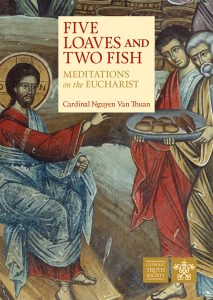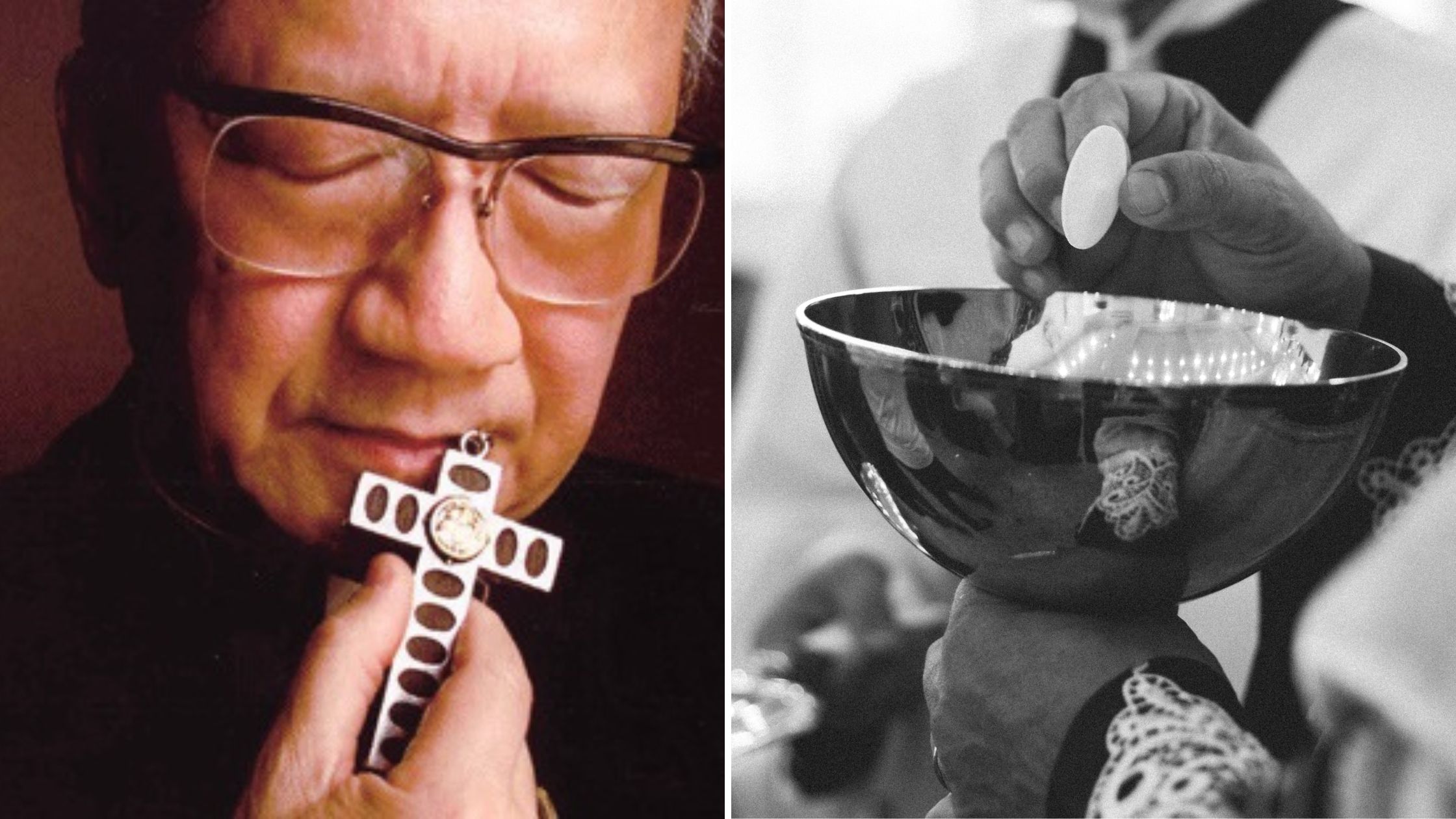Around the Eucharistic table the harmonious unity of the Church is realized and made manifest; the mystery of missionary communion, in which all feel that they are children, sisters and brothers.
– (John Paul II, 15th August, 1996)
“Were you able to celebrate the Eucharist in prison?” is one question that many people have asked me. The Eucharist is the most beautiful prayer; it is the culmination of the life of Jesus. When I answer ‘yes’, I already know the next question: “How were you able to obtain the bread and wine?”
When I was arrested, I had to leave immediately, with empty hands. The next day I was allowed to request in writing the things I needed most: clothes, toothpaste… I wrote to my addressee: “Please, could you send me a bit of medicine for my bad stomach?” The faithful understood what I meant and they sent a little bottle of wine for Mass, which they labelled “stomach medicine,” as well as some hosts sealed in a flashlight to protect them from the humidity. The police asked me: “Do you
have a bad stomach?”
“Yes,” I answered.
“Here’s some medicine for you.”
I will never be able to express my immense joy: every day, with three drops of wine and one drop of water in the palm of my hand, I celebrated my Mass.
It depended on the situation, however. On the boat that brought us north, I celebrated at night with the prisoners who received communion around me. At times I had to celebrate while everyone was bathing after callisthenics. In the reeducation camp, the prisoners were divided into groups of fifty; we slept on common beds and everyone had the right to fifty centimetres of space. We arranged it so that there were five Catholics near me. At 9:30pm the lights were turned off and everyone had to sleep. I curled up on the bed to celebrate Mass, from memory, and I distributed communion by reaching under the mosquito netting covering us. We made small containers from cigarette packages in which to reserve the Blessed Sacrament. Jesus in the Eucharist was always with me in my shirt pocket.
In The Road of Hope I wrote: “You believe in one strength: the Eucharist, the Lord’s Body and Blood that gives you life. ‘I have come so that they may have life and have it abundantly’ (Jn 10:10). As manna nourished the Israelites on their journey to the Promised Land, so the Eucharist nourishes you on your road of hope” (no. 983).
We had weekly indoctrination sessions in which the whole camp had to participate. During our break, I and my Catholic companions took advantage of the opportunity to pass to each other, or to the other four groups of prisoners, the little container that held the Blessed Sacrament: they all knew that Jesus was among them, he who could heal all their physical and mental suffering. At night, the prisoners took turns for adoration; Jesus helped us in a tremendous way with his silent presence. Many Christians regained the fervour of their faith during those days, and Buddhists and other non-Christians converted. The strength of Jesus’ love is irresistible. The darkness of prison became light; the seed germinated underground during the storm.
Every time I offer Mass I have the opportunity to extend my hands and nail myself to the cross with Jesus, to drink with him the bitter cup.
Every day, praying and hearing the words of the consecration, I confirm with all my heart and with all my soul a new covenant, an eternal covenant between me and Jesus, through his Blood mixed with mine (cf. 1 Co 11:23-25).
Jesus began a revolution from the cross. Your revolution must begin from the Eucharistic table and has to be carried forward from there. In this way you will be able to renew humanity.
In my nine years in solitary confinement, I celebrated Mass every day around 3:00pm: the hour of Jesus agony and death on the cross. I was alone, so I could sing the Mass as I wished: in Latin, French, or Vietnamese… I always carried the little container holding the Blessed Sacrament: “You in me and I in you” (Jn 6:20). These were the most beautiful Masses of my life.
At 9:00pm I made an hour of adoration, singing the Lauda Sion, Pange Lingua, Adoro Te, Te Deum, and other hymns in Vietnamese over the noise of the loudspeakers that blared from 5:00am to 11:30pm every day. I felt a singular peace of spirit and of heart, and the joy and serenity of the companionship of Jesus, Mary, and Saint Joseph. I sang the Salve Regina, Salve Mater, Alma Redemptoris Mater, Regina Coeli… in union with the Universal Church. Despite the accusations and the calumnies levelled against the Church by my interrogators, I sang Tu es Petrus, Oremus Pro, Pontifice Nostro, Christus Vincit.
Just as Jesus relieved the hunger of the crowd that followed him in the desert, it is he himself who continues to be the food of eternal life in the Eucharist. In the Eucharist we announce the death of Jesus and we proclaim his resurrection. There were moments of infinite sadness; how did I survive? By looking at Jesus crucified and abandoned on the cross. To human eyes the life of Jesus was a defeat, a disappointment, a failure. However, in God’s eyes Jesus accomplished the most important act of his life on the cross, because he poured out his blood to save the world. How greatly Jesus was united to God when on the cross he could no longer preach, cure the sick, visit the towns and villages, perform miracles, but remained absolutely immobile!
Jesus is my first example of radical love for the Father and for souls. Jesus gave everything: “He loved them to the end – in finem dilexit” (Jn 13:1), up to the very moment of the “It is finished – consummatum est” (Jn 19:30).
And the Father loved the world “For God so loved the world that he gave his only Son – ut Filium suum unigenitum traderet” (Jn 3:16). To give himself as bread “for the life of the world – pro mundi vita” (Jn 6:51).
Jesus said: “I have compassion for the crowd – misereor super turbam” (Mt 15:32). The multiplication of the loaves is an announcement, a sign of the Eucharist that Jesus will soon institute.
My dear reader listen to John Paul II:
Jesus lives among us in the Eucharist… Amidst the uncertainties and distractions of daily life, imitate the disciples on the road to Emmaus… Call out to Jesus to remain with you always along the many roads to Emmaus of our time. May he be your strength, your point of reference, and your enduring hope. (15th August, 1996)
Prayer
The Present and the Past
Beloved Jesus,
this evening, sitting toward the back of my cell,
without light, without a window, in the stifling heat,
I think with overwhelming nostalgia of my pastoral life.
Eight years as bishop living in the residence
only two kilometres from my prison cell,
on the same street, near the same sea shore…
I can hear the waves of the Pacific
and the bells of the cathedral.
Once I used to celebrate the Eucharist with a
gold-plated paten and chalice;
now I hold your Blood in the palm of my hand.
Once I used to travel the world over to attend
conferences and meetings;
now I am confined to a narrow cell without a window.
Once I used to visit you in the tabernacle;
now I carry you, night and day, in my shirt pocket.
Once I used to celebrate Mass for thousands of faithful;
now, in the darkness of the night,
I give communion under a mosquito net.
Once I used to preach the spiritual exercises
to priests, religious, lay people…
now a priest, who is also a prisoner,
preaches the exercises of Saint Ignatius to me
through a crack in the wall.
Once I used to have solemn benediction of
the Blessed Sacrament in the cathedral;
now I have Eucharistic adoration in silence every night
at 9:00, softly singing the Tantum Ergo and the
Salve Regina, and concluding with this short prayer:
“Lord, now I am content to accept everything
from your hands: all the sadness, the suffering,
the anguish, even my death. Amen.”
I am happy, here in this cell,
where white mushrooms are growing on my sleeping mat,
because you are with me,
because you want me to live here with you.
I have spoken much in my lifetime;
now I speak no more.
It is your turn to speak to me, Jesus.
I am listening to you:
What have you whispered to me?
Is it a dream?
You do not speak to me of the past or of the present,
you do not speak of my sufferings or of my anguish
you speak to me of your plans, of my mission.
So I sing of your mercy in the darkness,
in my weakness, in my annihilation.
I accept my cross and I plant it,
with my own two hands, in my heart.
If you were to permit me to choose
I would change nothing,
because you are with me!
I am no longer afraid, I have understood.
I am following you in your passion
and in your resurrection.
(Solitary confinement, Phú Khành prison (Central Vietnam), 7th October, 1976, Feast of the Holy Rosary.)
 This blog is extracted from Five Loaves and Two Fish, in which Cardinal Nguyen Van Thuan offers reflections on the Eucharist and aspects of our faith, informed by his experience of suffering and trust in God inside a Vietnamese prison.
This blog is extracted from Five Loaves and Two Fish, in which Cardinal Nguyen Van Thuan offers reflections on the Eucharist and aspects of our faith, informed by his experience of suffering and trust in God inside a Vietnamese prison.
For more inspiring reflections by Venerable Francis-Xavier Nguyễn Văn Thuận, order your copy of Five Loaves and Two Fish today.
